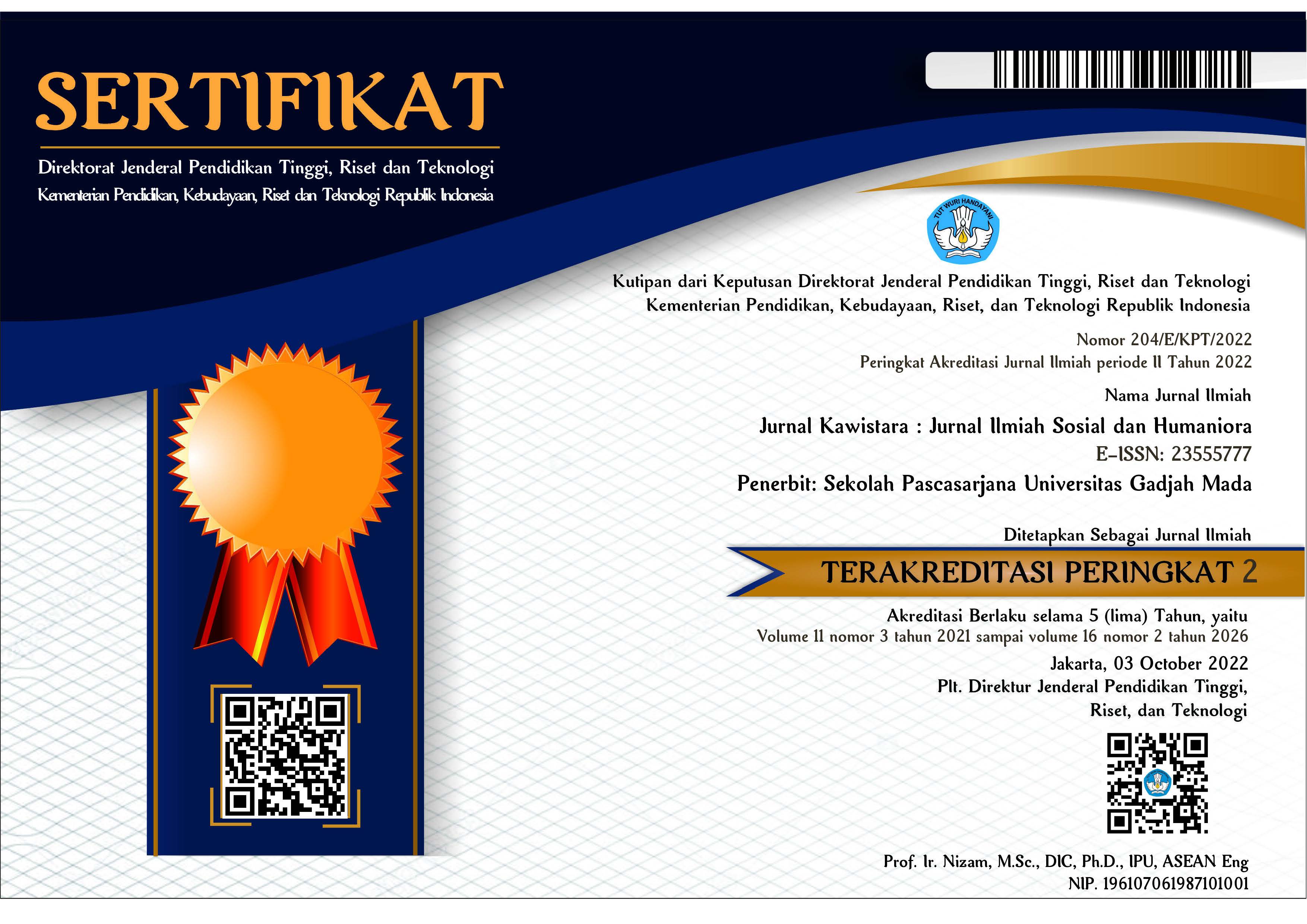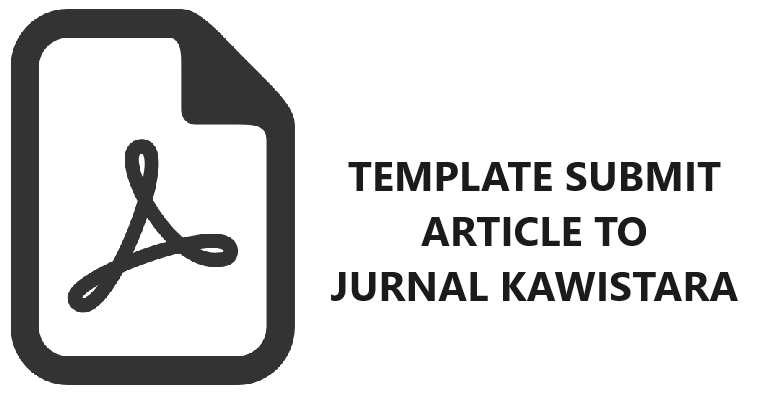FILM DOKUMENTER SEBAGAI KATALIS PERUBAHAN SOSIAL: STUDI KASUS AMBON, ACEH DAN BALI
Budi Irawanto(1*), Theresia Octastefani(2)
(1) Pusat Studi Sosial Asia Tenggara; Fakultas Ilmu Sosial dan Ilmu Politik, Universitas Gadjah Mada
(2) Fakultas Ilmu Sosial dan Politik, Universitas Gadjah Mada
(*) Corresponding Author
Abstract
Since democratization (Reformasi) in 1998, documentary films gradually evolve with their locus of production spreading across the Indonesian archipelago. With the spirit of democratization brought about by digital technology, film communities and civil organizations in outer islands of Java utilize digital documentary film to capture several pertinent socio-political issues and raise public and government attention and responses. Those issues are commonly overlooked by the local media and were never a part of local government’s policies. Based on our fieldwork conducted in three areas outside of the Java Island (Ambon, Aceh and Bali), where digital documentary filmmaking and civil organizations are active and vibrant, our study indicates that rather than simply producing documentaries, film communities or non-governmental organizations disseminated documentaries through public screenings to invite further engagement of audiences by discussing the film with authorities (policy makers) that were often invited in that event. In this article, we attempt to illuminate how documentary filmmaking allows the unseen and neglected issues to be articulated visually and sonically. Therefore, it would be compelling public or media attention and encouraging further government policy to resolve that matters. In other words, documentary films are a catalyst for social change by taking their roles as witness for the public and demanding responsibilities of the political authority.
Keywords
Full Text:
PDFReferences
Al Qurtuby, Sumanto. 2016. Religious Violence and Conciliation in Indonesia: Christians and Muslimsin the Moluccas. London dan New York: Routledge.
Argawa, I Made. 2016. Jumlah Anjing di Tabanan Pada 2017 Diperkirakan Capai 53 Ribu Ekor. Tribun News. Diakses pada tanggal 10 Oktober 2018 < http://bali.tribunnews.com/2016/12/08/jumlah-anjing-di-tabanan-pada-2017-diperkirakan-capai-53-ribu-ekor.>
Aufderheide, Patricia. 2007. Documentary Film: A Very Short Introduction. Oxford: Oxford University Press.
Badan Pusat Statistik. 2010. Sensus Penduduk 2010. Diakses pada tanggal 30 Oktober 2018. <https://sp2010.bps.go.id/index.php/site/tabel?tid=321&wid=0 2018>.
Badan Pusat Statistik Provinsi Maluku. 2017. Provinsi Maluku Dalam Angka. Ambon: BPS Provinsi Maluku.
Bose, Tapan. 2018. My Film, My Politics. Dalam Towards People Cinema: Independent Documentary and Its Audience in India. Editor K. Basu dan D. Banerjee, New Delhi: Three Essays Collective.
Cribb, Robert. 1990. The Indonesian Killings 1965-1966: Studies from Java and Bali. Monash Paper on Southeast Asia, No.21. Clayton; Victoria.
Galuh, I Gusti Agung Ayu Kade. 2017. Media Sosial dan Demokrasi: Trnasformasi Aktivitas Media Sosial ke Gerakan Nyata Bali Tolak Reklamasi. Yogyakarta: Polgov.
Irawanto, Budi. (2010). Contemporary Indonesian independent documentary in the Yogyakarta Documentary Film Festival: a note from juror’s seat. Asian Cinema, 21(2): 150-162.
Irawanto, Budi. 2012. “Beyond Big Dramatic Moments: Indonesian Documentary Films in the 21st Century.” Dalam, Asian Documentary Today. Diedit oleh J.H. C. Yu dan Asian Network Documentary, Busan: Busan International Film festival.
Imran, Rahat. 2016. Activist Documentary Film in Pakistan: The Emergence of a Cinema of Accountability, London dan New York: Routledge.
Katalog Aceh Film Festival. 2017. Refleksi, Banda Aceh: Aceh Film Festival.
McLane, Betsy. 2012. A New History of Documentary Film, New York dan London: Continuum.
Prakosa, Gatot. 1997. Film pinggiran: antologi film pendek, film eksperimental dan film documenter. Jakarta: FFTV-IKJ & YLP.
Prasetyo, Stanley Adi dan Birks, Teresa, Background and Political Situation in Aceh. Dalam Aceh: The Role of Democracy for Peace and Reconstruction. Diedit oleh Olle Tornquist, Stanley Adi Prasetyo dan Teresa Birks, Yogyakarta dan Jakarta: PCD Press & ISAI.
Robinson, Geoffrey. (1995). The Dark Side of Paradise: Political Violence in Bali. Ithaca dan London: Cornell University Press.
Saraswati, Asri. 2012. “The Urban-Rural Dichotomy in the Indonesian Documentaries in Nona Nyonya? and Untuk Apa?.” Wacana 14(1):17-36.
Stover Iii, John A. 2013. Framing Social Movements Through Documentary. Contexts, 12 (4):56-58.
Tornquist, Olle, Prasetyo, Yosep Adi, dan Birks, Teresa. (Eds.). 2009. Aceh: The Role of Democracy for Peace and Reconstruction, Yogykarta dan Jakarta: PCD Press dan ISAI.
Torchin, Leshu. 2012. Creating the Witness: Documenting Genocide on Film, Video and the Internet, Minneapolis dan London: University of Minnesota Press.
Vaughan, Dai. 1999. For Documentary: Twelve Essay, Berkley: University of California Press.
Winston, Brian, Vanstone, Gail, dan Chi, Wang. 2017. The Act of Documenting: Documentary Film in the 21st Century, New York dan London: Bloomsbury.
Yin, Robert K. 1984. Case Study Research: Design and Method, Newbury Park: Sage.
Article Metrics
Refbacks
- There are currently no refbacks.
Copyright (c) 2019 Budi Irawanto and Theresia Octastefani

This work is licensed under a Creative Commons Attribution-ShareAlike 4.0 International License.
Jurnal Kawistara is published by the Graduate School, Universitas Gadjah Mada.











